21 Warning Signs Your Cat Is Crying For Help
Breathing Issues, Sudden Appetite Changes, Abnormal Litter Box Issues, and many more are the Warning Signs Your Cat Is Crying For Help. Know when to take your cat to the vet when not feeling well.
By: Elizabeth Rikas
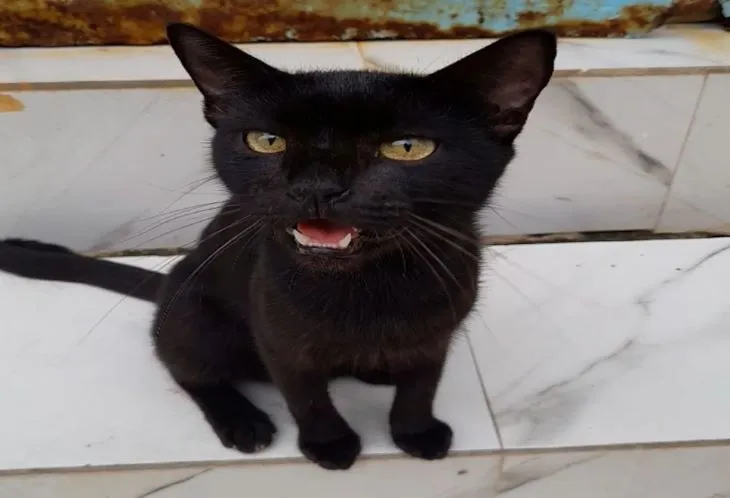
The information in this article is intended to educate cat parents and is not a substitute for veterinary guidance. In case of any concerns about your cat’s health, please talk with your veterinarian.
As a pet mom for over a decade and lessons learned by volunteering with animal shelters, I have observed that cats are masters at concealing their pain and discomfort. However, they exhibit specific behaviors when distressed, especially in the presence of their owners or favorite objects.
Many cat owners overlook crucial warning signs due to their feline companion’s quiet nature. These signs indicate that cats need help and may be forced to cry to express their distress.
If I talk about the common warning signs, they include vomiting, diarrhea, body injuries, swelling, and various other symptoms. Failing to address these issues quickly can lead to severe consequences and may even prove fatal in the long run.
However, many cat owners find it challenging to understand their cat’s behavior, recognize signs of pain, and wish to learn how to prevent or manage these situations.
Click to read: How to trim cat’s nails?
Let me share some of these subtle signs in this article with you to enable you to understand when to take your cat to the vet.
Changes In Appetite Or Thirst

If your cat starts eating or drinking differently than usual, it could be a sign that something is wrong. If your ravenous feline suddenly loses interest in their food or water, it could be a sign that something is wrong, such as stress and tension. If your cat is eating or drinking a lot more than usual, it could mean there’s a health problem going on.
Unexplained Weight Changes
Closely related to changes in appetite, unexpected weight loss or gain can be a red flag that your cat needs help. Rapid weight loss, in particular, can be a sign of a serious health problem such as diabetes, hyperthyroidism, or cancer. If you notice your cat’s body condition changing, it’s time to talk to your vet.
Lethargy And Decreased Energy
Cats are known for their love of naps, but if your usually playful kitty is suddenly spending all their time sleeping or seems uninterested in their favorite activities, it could be a sign that they’re not feeling well. Lethargy can be a symptom of many health issues, from infections to chronic conditions like arthritis.
Litter Box Issues
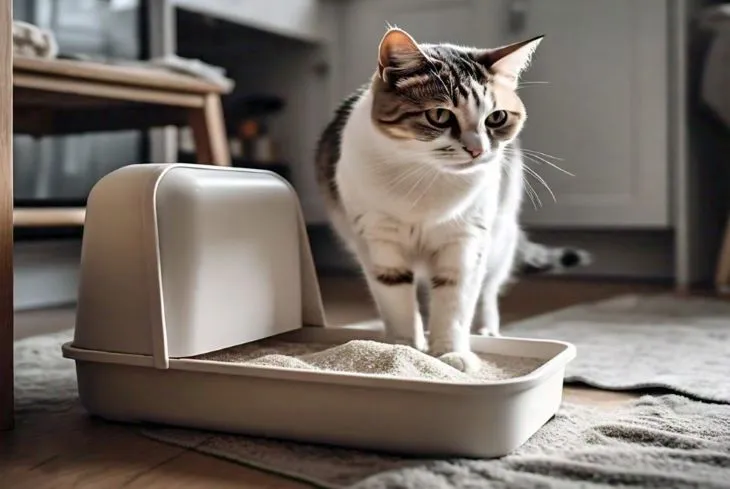
Changes in your cat’s bathroom habits can indicate something is amiss. If your cat is peeing more often, having trouble going, or making messes outside the litter box, it could have a urinary tract infection, bladder stones, or other health issues. Diarrhea and constipation can also point to digestive issues that need attention.
Breathing Difficulties
If your cat is panting, breathing fast, or having trouble stabilizing their breath, it’s a big worry. Breathing problems can happen for different reasons, such as allergies or heart issues. You should quickly take your cat to the vet to check what’s wrong.
Hiss And Bite
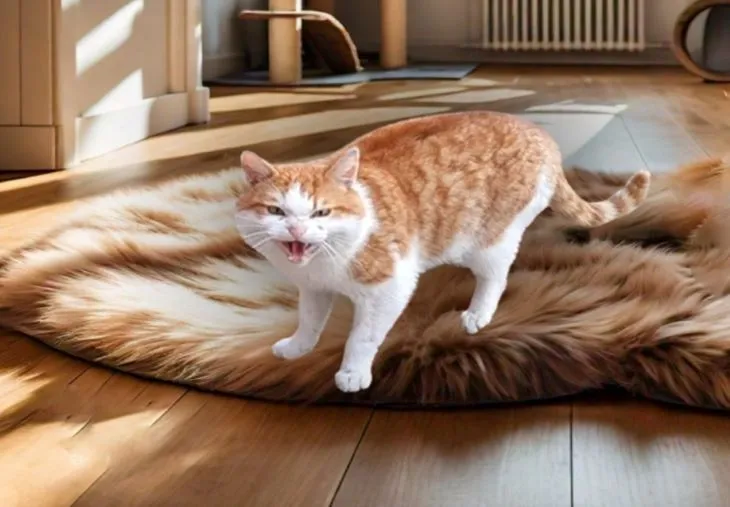
While some cats are naturally grumpy, a sudden change in temperament can indicate that your feline is in pain or distress. If your usually nice cat starts hissing, biting, or avoiding you, it could mean they feel unwell or upset.
Skin And Coat Changes
Your cat’s skin and coat can provide valuable clues about their health. Seeing your cat losing lots of fur, having bald spots, or looking irritated might mean they have parasites, allergies, or other skin problems. If your cat’s fur looks oily, dull, or dry, it could indicate they’re not healthy.
Excessive Vocalization
While some meowing is normal, excessive or unusual vocalization can be a warning sign that your cat needs help. Yowling, crying, or meowing more than usual can indicate pain, discomfort, or anxiety. Watch how often and how your cat makes sounds to see if they need to see a vet.
Over-Grooming Or Lack Of Grooming
Cats are fastidious groomers, but both over-grooming and a lack of grooming can be signs of trouble. Over-grooming, or excessive licking and biting of the skin, can lead to bald spots and irritation and may be a sign of stress, allergies, or pain. On the other hand, a sudden decrease in grooming can indicate that your cat is too sick or painful to keep up with their usual hygiene routine.
Behavioral Changes
In addition to the symptoms mentioned above, any sudden change in your cat’s behavior or routine can be a warning sign that they need help. If your cat starts hiding more than usual, seems disoriented, or acts out of character, it’s worth investigating further.
Limping Or Difficulty Moving

If your cat is limping, has trouble jumping, or seems stiff and uncomfortable, it may be a sign of injury or a condition like arthritis. Cats are experts at hiding their pain, so even subtle changes in mobility should be taken seriously. Limping may also be caused by arthritis.
Swelling Or Lumps
Pay attention to your cat’s body during petting and grooming, and note any unusual swelling or masses. A veterinarian should check out any new lump or bump on your cat’s body, as it could be a sign of infection, inflammation, or cancer.
Bad Breath And Dental Issues
While cat breath is never minty fresh, unusually foul odors can indicate dental disease or other health problems. If your cat’s breath smells particularly bad, or if you notice excessive drooling, difficulty eating, or red, swollen gums, it’s time for a dental checkup.
Decreased Interest In Positive Interaction
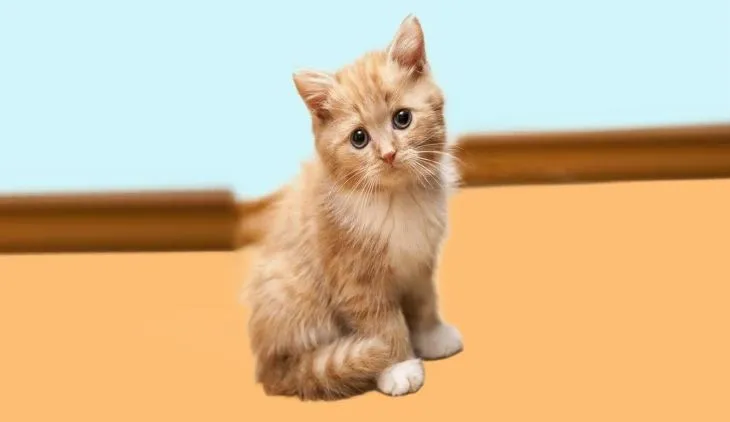
If a cat hurts, it probably won’t want to do fun things like playing or going outside. It might feel too sick or too focused on its pain. Discomfort and stress can all cause cats to withdraw from their favorite people and activities.
Changes In Sleep Patterns
While cats are known for their love of naps, a sudden change in sleeping habits can be a warning sign. If your cat is sleeping a lot more or seems restless, it could mean something is wrong with their health.
Vomiting And Diarrhea
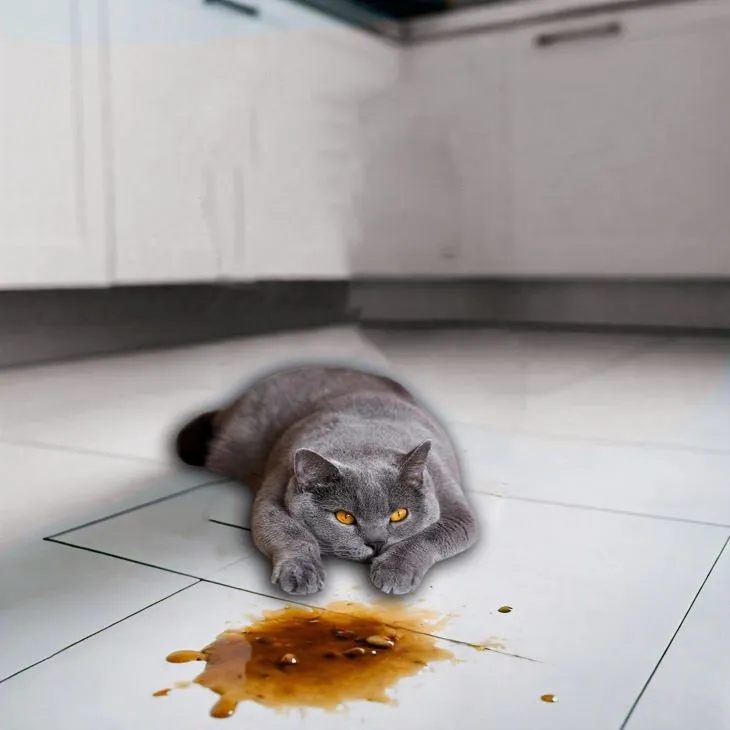
Though it’s normal for cats to have the occasional hairball or upset stomach, frequent or serious vomiting and diarrhea can quickly cause dehydration and other health issues. If your cat is experiencing persistent digestive upset, it’s important to seek veterinary care.
Signs Of Injury Or Trauma
If your cat has been in a fight, fallen from a high surface, or experienced any other traumatic event, it’s important to watch for signs of injury. Even small injuries can become serious if you don’t care for them.
Pain And Discomfort
Cats are masters at hiding their pain, but there are some subtle signs to watch for. Hunched posture, restlessness, panting, or avoidance of touch can indicate your cat is in discomfort. If you think your cat is hurting, call your vet for help.
Bleeding or Discharge
It should be considered a red flag if you notice any unusual bleeding or discharge from your cat’s body. Discharge can be a sign of infection, injury, or other health problems, whether from the eyes, nose, mouth, or other areas. If you notice any unusual secretions, it’s time to call the vet.
Collapse Or Fainting
If your cat unexpectedly falls or loses consciousness, it is never too late to take it to the hospital for emergency treatment and urgent care. Fainting can be caused by a variety of serious health issues, from heart disease to poisoning, and prompt treatment is essential for the best outcome.
Ear And Eye Issues
It could be a sign of infection or mites if you notice discharge, redness, swelling, or excessive wax in your cat’s ears. Similarly, cloudy, watery, or red eyes can indicate various eye problems that require veterinary care.
What Should You Do If You Think Your Cat Is In Pain?
If you suspect your cat is in pain or experiencing any of the warning signs mentioned above, the first step is to contact your veterinarian. They can determine the problem is seriousness and suggest what you should do next. Sometimes, you may need to bring your cat in for an examination or emergency treatment.
Click to learn: How to give a cat a pill?
In the meantime, there are a few things you can do to keep your cat comfortable:
- Provide a quiet, safe space for your cat to rest and recover.
- Ensure your cat can easily reach its food, water, and a tidy litter box.
- Avoid touching your cat too often, which may cause additional pain or stress.
- Follow your vet’s advice, such as administering medication or monitoring your cat’s condition.
How Is Pain Treated In Cats?
The way to help cats with pain depends on what’s causing it and how bad it is. Medicines like opioids, non-steroidal anti-inflammatory drugs (NSAIDs), or gabapentin can help manage pain in some cases. Your veterinarian may also recommend other therapies, such as acupuncture, massage, or physical therapy, to help alleviate pain and promote healing.
If the problem is serious, your cat might need surgery to fix what’s causing the pain and make them feel better.
When Should You Go To The Vet?
While you can handle some small health problems at home, there are times when your pet needs to see a vet right away. If your cat is experiencing any of the following, it’s time to head to the vet:
- Difficulty breathing, panting, or wheezing.
- Collapse or loss of consciousness.
- Serious throwing up or pooping a lot, especially if there’s blood.
- Inability to urinate or defecate.
- Seizures or neurological symptoms.
- Severe pain or distress.
- Trauma or injury.
- Other sudden or big changes in how your pet acts or feels.
It’s safer to be careful when unsure and take your pet to the vet. Your veterinarian can help you determine the best course of action and provide the care your cat needs to feel their best.
How To Prevent Illness In Cats?
While not all health problems can be prevented, there are many steps you can take to support your cat’s overall wellness and reduce the risk of illness:
- Provide a balanced, species-appropriate diet and plenty of fresh water.
- Help your cat stay at a good weight by feeding them right and giving them enough exercise.
- Make sure your cat gets its shots on time and take steps to prevent fleas and ticks.
- Provide a clean, safe environment with plenty of enrichment and mental stimulation.
- Make regular appointments with your vet to catch any health problems early.
- Be proactive about dental care, including regular brushing and professional cleanings.
- Watch your cat’s actions and health carefully, and go to the vet when you see a problem.
If you care for your cat and pay attention to their well-being, they can experience a lengthy, healthy, and joyful life.
Frequently Asked Questions
Conclusion
As a cat owner, you must know about your cat’s needs, and it might be asking for help. From changes in appetite and behavior to more obvious symptoms like vomiting or limping, there are many ways that cats communicate their distress.
By keeping an eye out and going to the vet as soon as you notice a problem, you can help your cat stay healthy and happy for a long time. Remember, your cat depends on you to be their advocate and protector – so don’t hesitate to speak up if you think they need help.
